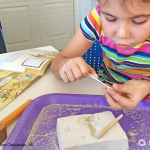Spend some of your summer investing in the extras, electives, and life skills that don't make it into a school year of academics.

The summer months are a more relaxed time that you could use to brush up on life skills that get overlooked throughout the traditional school year.
During the school year, we focused on basic educational standards. Reading, history, writing, and math took center stage for most of the year. While it’s important to learn academics, they don’t count for everything. Incorporating life skills provides your child with a well-rounded education. Sure, it’s amazing the number of life skills your children pick up on as you carry on throughout your day. Having your children tag along at the grocery store, help cook dinner and even attending church can provide them with many life skills they need as they grow.
When it comes to extending everyday day tasks into deeper developed life skills, make your actions intentional. Here are 4 essential life skills that you should take the time to teach your children:
1. Home Skills
How well can your children accomplish daily household tasks? This summer, teach them the basics of cooking, laundry, cleaning, and home repairs.
Keep a chore chart for your children to ensure that they help around the house. Switch it up so they learn about different tasks both inside and outside the house. Diminish any fear your child has of using the dishwasher, microwave, clothes washer or even the lawnmower by empowering usage. You might offer an allowance for the extras chores to encourage a sound work ethic and money management skills.
Cooking is an essential skill for good health and a great way to save money. Share this chore with your children as they grow to ensure they can make their own meals in adulthood.
To teach everything that goes into providing a meal for the family, assign your child a day of the week to provide the family dinner. Provide a budget and have your child plan the meal, purchase the items needed at the grocery store, follow the recipe and even cleaning up after the dinner. Giving your child the ability to plan, purchase and cook the meal provides an understanding all that goes into providing a meal for a family.
Home repairs are life skill easily overlooked. While your comfort level with these tasks could vary, teaching these skills with an audience may elevate your stress level. The idea of a child watching me fumble through hanging a picture on the wall causes sweaty palms even today but my children all know how to find a stud and use a hammer. Teach them basic sewing, how to re-caulking a shower and unclogging a drain. Call these beneficial skills House Repairs 101 and I assure you, your adult children will thank you.
2. Awareness of Self and Others
All relationships have challenges, even the one you have with yourself. We are often our biggest critic. Children are no different. It’s important to teach your child self and stress management, help build self-esteem and promote a developed sense of humor. Some of this will come as you spend quality time with your child, having great conversations but some needs a bit more direction.
Encouraging a growth mindset can help build self-confidence. Welcome mistakes, let them express emotions and then guide them to a positive mindset. This practice will help with self-esteem and provide them a channel to process and diminish stress. So much learning can come out of raw emotion and stumbles.
Out of all the emotions, laughter’s the easiest to work through. Encourage laughter and embrace silliness, both activities are contagious and essential. Life’s hard, help your child find the humor in it. Remember laughter produces endorphins, making us feel happier and have less stress.
The myth that homeschoolers lack socialization has been busted over and over again but social skills go beyond socialization. Its imperative children have the ability to build relationships. Encourage them to do the talking when people ask them questions, have them order properly when at a restaurant and reinforce sibling conflict resolution when you can. Learning how to foster relationships will only benefit their future personal and professional life.
Awareness extends beyond relationship management into learning proper etiquette. I’m not saying instruct an Emily Post class (although that’s not a bad idea - I always found her fascinating) but instead, teach your child proper table etiquette, how to behave in a crowded elevator and instill the importance of a thank you note.
I recently read about a family that has one formal dinner every few months. They set the table properly, follow table etiquette and talk through scenarios of how to behave while eating in the presence of different audiences. Everyone needs to know how to behave for a business lunch or fancy dinner. I wish I had thought of this idea.
3. Financial Literacy
Perhaps financial literacy rivals as the most overlooked life skill. This can include saving and investing, budgeting, banking, credit knowledge, and tax preparation.
Money management counts as one of the most stressful topics in a relationship and it’s uncomfortable to include your child in real-life conversations about household money woes. Because of that, this life skill easily gets skipped. But sending a child into the world without this instruction and expecting them to figure it out on their own, only amplifies any issues that may arise in the future.
At a very young age, you can start your child on basic chores around the house. A younger child can set and clear the table, gather their own laundry, and pick up their toys. As your child ages, their chores can grow, too. Provide an allowance to have them manage their own money can help them learn the value of money, a concept often lost on young children. I remember a friend telling me the story of her grandson. He wanted a toy at the store and when his mom told him that she didn’t have the money to buy the toy, the boy suggested that they go to the bank and ask for the money to buy the toy he wanted. As if the bank has a secret money tree free for the picking. Oh boy, if only!
As your child grows, so will their expenses. Teaching them to budget and encouraging them to save for those bigger items will teach them about money management while you’re still around to provide guidance.
Teaching teens about credit and spending within their means helps heighten their level of money management knowledge. Credit is confusing (even for adults), it’s important to explain the details of saving, investing and using credit wisely. In all reality, if you don’t provide them this guidance, credit cards and overspending might tempt them as young adults. The harm caused by learning this lesson on their own can affect them for many years, even following them into their own future marriage.
4. Literacy Skills
While this is a skill you develop throughout the homeschool year, especially as a Sonlighter, the importance of literacy goes beyond academics. Reading forms the foundation for various aspects of our lives, from understanding instructions to communicating with others, completing daily tasks, and accessing information. While the school year provides reading instruction and teaches reading skills, parents have the opportunity to build on these skills and make reading an even more personalized, relaxed experience.
Strong reading skills empower children to:
- become independent learners who can research topics that fascinate them,
- follow complex instructions for projects or games, and
- express their thoughts clearly in writing.
In our information-rich world, literacy also serves as a critical tool for evaluating sources, understanding different perspectives, and making informed decisions. Children who maintain and develop their reading skills over the summer are more likely to start the new school year feeling confident and prepared, having avoided the "summer slide" that can set back academic progress.
Making literacy engaging during summer months doesn't require formal lesson plans or expensive programs. Summer reading challenges can transform reading from a chore into an adventure by setting achievable goals and celebrating progress along the way. Families might challenge themselves to read books from different genres, explore stories set in places they plan to visit, or tackle a series together with discussions over meals. Creating reading journals, hosting family book clubs, or organizing reading picnics in different locations can add excitement and variety to the experience.
Other Life Skills
Sonlight includes many basic life skills. Reading great books develops critical and creative thinking, supports positive decision making, boosts problem-solving skills, and creates a love of learning. The conversations sparked and initiated with the Instructor’s Guides provide proof of the life skills Sonlight students pick up naturally. Adding to the life skills your children pick up daily, we offer many elective programs that can help with critical thinking, public speaking, typing, and even basic money management.








Great list! I agree, teaching young people to budget is so important! Sadly, I didn’t really learn how to budget until I was in my 30’s. For me, the You Need A Budget (YNAB) software program was a game-changer. It’s very user-friendly and they have many YouTube tutorials as well. I have used it to teach my children about budgeting. As soon as my teenage daughters got their first “real job,” they got their own YNAB account (students can get one year free). They both love this program and say it helps them “see” what their money is doing, and I feel they will be well-equipped to manage their finances when they are on their own.